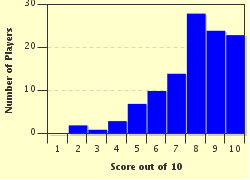Quiz Answer Key and Fun Facts
1. There were twelve tribes of Israel, each named for one of the children of Jacob (renamed Israel by an angel). Only one of them begins with the letter D... which one?
2. One of the ways that God spoke to his people was through dreams. While many different people received these dreams or interpreted them, only one came to be known as 'The Dreamer.' A son of Jacob, who was he?
3. She was the wife of Lapidoth, a prophet, and the fourth Judge of Israel. Her name translates from Hebrew as 'bee'. Who was she?
4. This woman was offered 1,100 shekels of silver from each of the Philistine leaders to betray the man who loved her. What was her name?
5. Who was the prophet Samuel speaking of when he said to King Saul, "But now your kingdom will not endure; the Lord has sought out a man after his own heart and appointed him ruler of his people, because you have not kept the Lord's command."?
6. Belteshazzar was the Babylonian name given to which Jewish noble?
7. In which of these biblical stories is there no mention of a donkey?
8. In Mark chapter 5, Jesus cast demons out of a man; they went into a herd of swine and promptly drowned the herd. Afterwards, Jesus told the man to go back to his home and tell everyone what the Lord had done for him. Where did he go?
9. Saul was a rabid persecutor of Christians until he had his own conversion experience. Near what city did this occur?
10. The Lord's Prayer was taught to the disciples by Jesus. Fill in the words that finish the final sentence in the NIV, "And lead us not into temptation, but _____."
Source: Author
reedy
This quiz was reviewed by FunTrivia editor
CellarDoor before going online.
Any errors found in FunTrivia content are routinely corrected through our feedback system.

